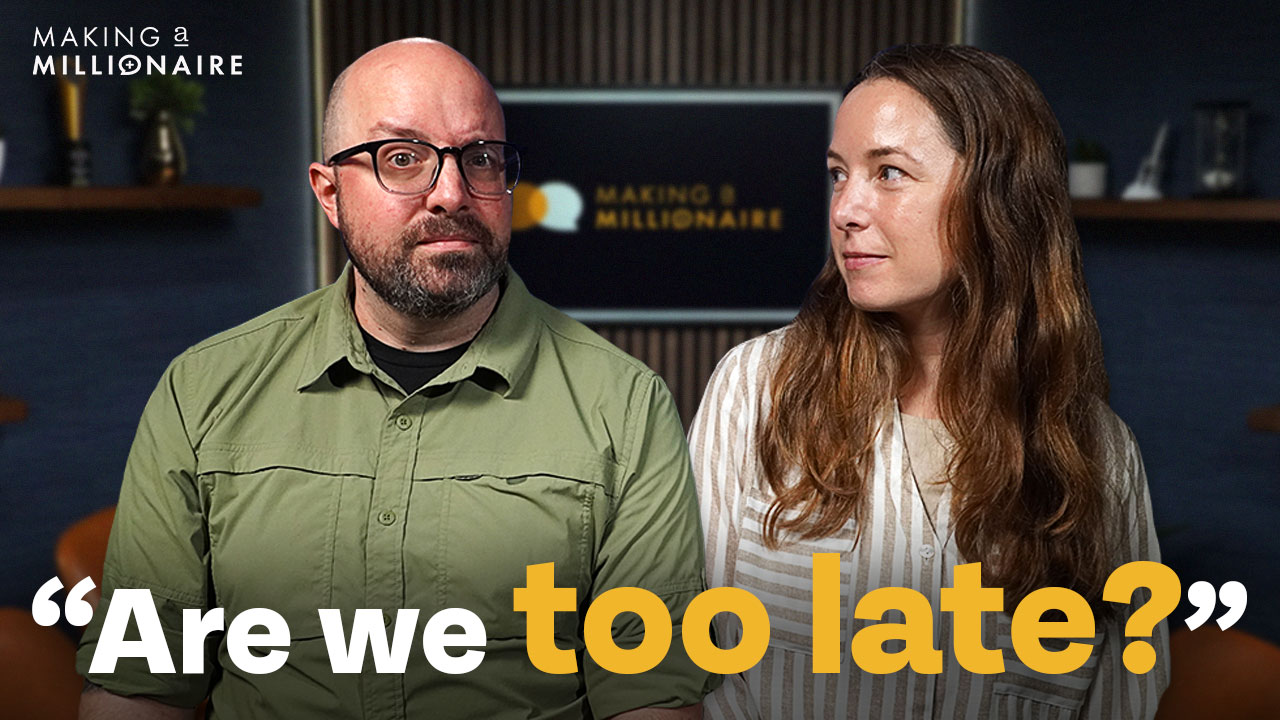Let’s move on to Ken’s question. He says, “I’m currently in Step 9, and we have reached our know-your-number goal. We will retire in 4 years at 55 with a second pension. Should I continue to save 25% until that retirement date, or should I focus on paying off the mortgage early?” I love this question because we’re always talking about getting to this point, so how should they think about it? They’re pretty close, which is exciting.
So, the language matters. I want you to read the question, just the beginning of it. I want to hear the part where he says his retirement. And this, what I’m trying to discern is, has he calculated that based on his savings, he’s going to hit that number, or is he four years away from retirement, he’s already there? Can you reread the question for me?
Yeah, it says, “I’m currently in Step 9. We have reached our know-your-number goal and will retire in 4 years at 55 with a second pension.”
So, it sounds like he’s reached it. It sounds like that. We have a culture of compliance here, so I do want to share we don’t know all of Ken’s variables. He’s given us some key things, so this is careful. This is not specific recommendations, but we can, based upon the way the question was answered, give some guidelines. If we were kind of doing some role-playing with a client here, a situation is obviously if you’ve reached the number and I have the goal that I want you to be completely debt-free when you actually cross that threshold of retirement in four years. You’ve got to figure out how, between now and then, you are completely debt-free with the mortgage. It’s crazy not to. So, I’m going to give you the freedom to figure out, is that something over the next four years you’re going to do 25% a year, or do you just go whole hog on it and pay off the debt? Then come back, but I will tell you this. This is another guidance that I share with brand new clients who are going through that threshold. You’re going to be very insecure that first year to two years that you retire because now when the market goes oopsy and goes down, if you get into that systemic risk of having a downturn right as you retire, you’re going to have a lot of insecurity.
So, I always tell all of my brand new clients hit retirement with some momentum, meaning that if you’re going, just like when you see a massive hill in front of you, a lot of times you’ll give it a little extra goose, the gas, so you hit that hill. You actually have extra momentum to push you through it. So, I’m not going to be telling you you don’t have to save another dollar from this day because I think that you could, just like Bears U, my daughter last night when we went to dinner, she was like, “Dad, did you know that there’s a competition where they actually take pictures of bears before they go into hibernation, and the fattest one, they like wins?” You know, they post all these things. Did not know that. No, I thought it was the coolest thing, and I wish I could remember the cutesy name that she told me this year’s winner was because there was this cool picture she showed us at dinner last night. And I would tell you I want you to be the fattest bear heading into your retirement. So, load it up, hit some momentum with that. But yes, I do want you to be completely debt-free when you hit retirement as well. Give some more details because I kind of gave an overview. I like the detail of being a fat bear. I like that a lot. I like that a whole lot. But I do, I do. I do. But there’s a butt. So, let me… I’ll say the first thing, and then I’ll say my little controversial thing. My first thing is, what’s beautiful, Ken, is when you know your number and when you have reached your number, we call that Financial Independence. When you’re in Financial Independence, the beautiful thing about being independent is you get to pick and choose what you want to do with your dollars. That’s what the dollars have allowed you to do. And so, should you continue saving? Well, if you want to. Should you stop saving? Well, if you want to. Right? I think you get to choose once you’re at Financial Independence how you want to deploy your dollars.
This is the only thing that gives me just a little bit of anxiety, and please don’t fight me. So, this is the butt. This would be the but if Ken, I agree, I love for my full retirees, full Financial Independence folks to be debt-free, but have the ability to be debt-free. And this what I mean. Let’s suppose that Ken is in that 2 and a half percent mortgage right now. If he’s got that 2 and 1/2 percent mortgage, so long as his liquid assets are robust enough, that money sitting in cash is earning like 5 percent. So, here’s what I like about what Brian said. When you come into retirement, you want to hit it with momentum. You want to go whole hog into it. The beautiful thing about having the ability to be debt-free is maybe you do retirement for that first year and say, “Okay, I got my sea legs about it. Now, I’m going to write the check and pay off the mortgage.” Okay, you know what? I want to make sure that I can get through these first markets; it’s a little soft right now. Okay, now, now I’m going to pay off the mortgage. I love the idea of having a plan for the mortgage to be gone, but I’m just realistic that right now, in this very unique interest rate environment, some but some flexible. Now, here’s what’s beautiful. He did say he’s four years away, so there’s some time to figure this out. But that’s one of the things that I would think about and consider as I was going into retirement. Agree, disagree? Want to fight with a rebuttal?
But I think you have get wealthy behaviors, and you have stay wealthy behaviors. Yep, I agree with him, and he’s obviously got the, he’s behind the get wealthy behaviors. We’ve already reached that point, so now drifting before retirement will not only it goes right in line with fattening yourself up before you go into hibernation. So, I think that now we’re splitting hairs, and you have to ask yourself, don’t get cute. What are your goals? Yeah, I mean, I would probably, ’cause, look, I’m a bridge builder. I will tell you B’s not wrong in the fact that me and him have had this debate about my own mortgage because I have the goal. I’m about to cross the threshold of 50, and I want to be completely mortgage-free. And I have the money to write a check right now, but I have a 2 and 1/2 percent mortgage.
So, I have, instead of writing the check on my birthday, I’ve just, I’ve got essentially a compartment in my cash reserves that it’s not even really part of my cash reserves. It’s on top of the cash reserves that I’m playing an arbitrage game momentarily. But if interest rates ever get dropped below 2 and 1/2 percent, I’m just going to stroke the check. But I don’t know if Ken has to do that. I still plan on working decades. But Ken, I just think, while he’s in the drifting side of the stay wealthy part, I think that you’re splitting hairs, and it’s probably, if it’s four years away, I mean, I bet this balance is already less than $100,000. Sure. And if it’s less than $100,000, let’s get that thing knocked out. For more information, check out our free resources.














